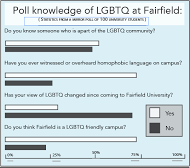In 2007, Fairfield was ranked 19th out of 20 colleges and universities in the U.S. as one of the most LGBTQ-unfriendly campuses, according to the Princeton Review. Fairfield is no longer on that list.
In those six years, Jesus Nunez ‘14, vice president of Fairfield’s LGBTQ advocacy club, Alliance, said he believes Fairfield students have become increasingly more accepting. In a recent informal survey of 94 Fairfield students conducted by The Mirror, Nunez’s belief proves to be true: 72 percent of those students said that they feel Fairfield is a LGBTQ-friendly community.
A Texas native, Nunez attended a rural high school where it was difficult to come out as gay. However, upon coming to Fairfield, he immediately joined Alliance.
“I wanted to be whoever I wanted to be,” Nunez said.
In 2007 when Nunez joined, Alliance was only a small group of 10 students, but only three were regularly committed members. Now, regular attendance is up to 20 to 25 students weekly.
Despite the progressive trend in LGBTQ friendliness on campus, the 28 percent of students who answered in the survey that Fairfield is an LGBTQ-unfriendly campus indicates that Fairfield still has work to do, such as in students’ usage of homophobic language.
Seventy-three percent said that they have overheard derogatory language being used on campus. Nunez said the language issue is “just a matter of a bit of knowledge” and could be avoided, but still does not get the sense that Fairfield has an overall homophobic climate.
Sophomore Cristina Boyle agreed: “Most of the time, I’ve heard people be accepting of others no matter race or gender or sexuality. Everyone I see on campus is smiling and laughing, enjoying each other’s company and conversation.”
Sophomore John Paul Kretkowski said he sees Fairfield as more LGBTQ-friendly than not, but there’s still “a particular minority that has prejudiced feelings.”
One way in which Alliance is trying to promote awareness of the LGBTQ community is through sponsoring events throughout the month of October, which is LGBTQ History Month.
According to LGBTHistoryMonth.com, a website affiliated with Equality Forum, LGBTQ History Month was first suggested in 1994 by a Missouri high school teacher. Rodney Wilson said that there should be a month dedicated to the celebration and teaching of gay and lesbian history. However, it did not attract much attention until 2006.
Equality Forum, a nonprofit organization whose mission is to “advance national and international lesbian, gay, bisexual and transgender (LGBT) civil rights through education,” assumed responsibility for advocating LGBTQ History Month.
Throughout the month of October, Equality Forum produces documentaries and disseminates information about 31 LGBTQ icons. Nunez added that LGBTQ history is “the portion of history that’s often ignored.” So, to raise awareness, Alliance hosts movie series, panels and guest speakers.
“The events are a way to start the conversation,” Nunez said. “It’s a seed that’ll grow into something bigger.”
However, in another informal survey of 100 students conducted by The Mirror, 45 percent said they did not know it was LGBTQ History Month, and 79 percent answered that they either did not know of or did not go to any events in recognition of LGBTQ History Month.
Kretkowski said that he had not seen much advertising for the events, but explained that most students may not go because they may feel uncomfortable seeing an event labeled as hosted by the LGBTQ community.
“It’s a difficult situation,” Kretkowski said. “People can be shy in that regard, and when you add another variable to it, it creates difficulties,” he said in regard to the conversational atmosphere of some events.
Kretkowski said he feels that if the events were structured more as ice breakers where students could slowly engage themselves to be introduced to the topic of the LGBTQ community, then attendance rates would go up.
On the other hand, Ava Szabatura ‘16 said “I think [Fairfield is] really supportive of LGBTQ. I saw brightly colored advertisements on the TVs in Barone last year and this year promoting LGBTQ events. They really caught my eye.”
Nunez added that, because Fairfield is a relatively small school, attendance rates are likely to be lower. But in a collegiate closet survey conducted in 2007, it found respondents “referenced the low level of LGBT visibility on the Fairfield University campus as an indicator and perpetuator of the homophobia.” The study concluded that due to low visibility, “it hampers the coming out process by causing one to view one’s sexual inclinations as abnormal.”
Another difficulty Nunez recognizes is that people may find Fairfield LGBTQ-unfriendly because of the typical Catholic stance that is against homosexuality. However, at Fairfield Nunez finds the Jesuits accepting.
Fr. James Bowler, S.J., is a supporter of the LGBTQ community. He says that people should listen more closely to the LGBTQ community about their experience of God and encourage them to have that experience. “It’s an incredible struggle these people have,” Bowler said. “They will find God in that.”
He believes, “Sexuality is a God-given gift to each individual. It is a matter of human challenge, and if you don’t respect it, you repress it at the cost of human flourishing.”
Nunez also added that campus ministers are great people to reach out to and urges any LGBTQ people who may have issues with their faith, that there’s always someone to talk to in Campus Ministry at Fairfield.
Kretkowski, a devout Protestant, recognizes the clash Catholics may have with homosexuality, but has a different opinion. “In the Old Testament, Jesus said ‘You should love thy neighbor as thyself.’ So I take that as, he wouldn’t discriminate [against] 7 gays, so I won’t either.”


Leave a Reply